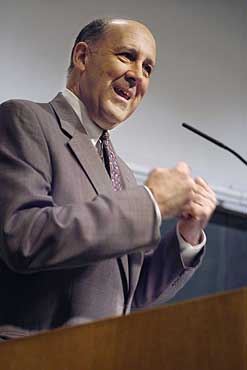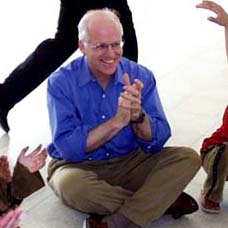
A poll from St. Norbert College released this week showed Doyle with a 13-point lead over Green, 51% to 38%, though that poll does not square with many other polls showing a tighter contest - in some cases, a statistical dead heat. Wisconsin Governor Jim Doyle and his wife served as Peace Corps Volunteers in Tunisia in the 1960's.
Doyle has a slight edge in the polls
Green-Doyle race gets edgier
Adversaries spar in last round of debating
By GREG J. BOROWSKI and STEVEN WALTERS
gborowski@journalsentinel.com
Posted: Oct. 20, 2006
La Crosse - Democratic Gov. Jim Doyle and Republican challenger Mark Green went toe to toe for the final time Friday night in a debate that brought a new testiness to their encounters.
Green, who analysts said had the most at stake because he is the challenger, called out Doyle on health care costs, University of Wisconsin System tuition and casino cash, saying that "one election and millions in contributions" led Doyle to change his position on tribal casino expansion.
Doyle, who has a slight edge in the polls, positioned himself as a common-sense governor who made tough decisions and portrayed Green as desperate to hang on to money from out-of-state special interests.
Green is fighting a directive from the State Elections Board to return $467,844 in money from out-of-state political action committees that he transferred from his U.S. House campaign fund to his state account.
"I can't take that money for governor," Doyle said, arguing that Green wanted to create a "loophole" just for himself to keep it.
The group We the People sponsored the debate, the third faceoff between Green and Doyle, who plan to spend the next 17 days until Nov. 7 on the campaign trail. Green and Doyle are to be in northwest Wisconsin today.
A poll from St. Norbert College released this week showed Doyle with a 13-point lead over Green, 51% to 38%, though that poll does not square with many other polls showing a tighter contest - in some cases, a statistical dead heat.
At the end of the debate Friday, Green asked voters to "come along with me" on a new path, saying that Doyle had lost his way and was left to point fingers at others: "There's a sign in the governor's office, I'm betting, that says, 'Pass the buck.' "
Doyle said he had worked in his first term to "look out for ordinary citizens of the state" and painted Green as a tool of special interests. Citing his work to improve access to prescription drugs from Canada, Doyle said Green "voted on the side of drug companies."
A look at key topics:
Casinos: For the first time, Green accused Doyle of benefiting from "millions of dollars" in campaign donations from tribes that run casinos and other "gaming interests."
Green campaign manager Mark Graul later said that the total included donations from tribes and family members and business associates of Dennis Troha's. A Kenosha executive and developer, Troha is pushing the request for a Kenosha casino.
When Doyle ran for governor in 2002, Green said, he was opposed to the expansion of casino gaming. But, Green added, after the cash, "he's suddenly done a 180" change in position.
By negotiating gaming compacts in 2003 that resulted in the most dramatic expansion of casino gambling in Wisconsin history, Green said, "Governor Doyle has destroyed people's faith in this process."
Asked after the debate to put a number on the casino-interest dollars that have helped Doyle's two campaigns, Green said that is "hard to know exactly," because tribes indirectly helped Doyle by giving to the Democratic Governors Association, which then donated to the Doyle campaign. Graul said tribes gave the Democratic governors group $750,000 in 2002.
Doyle called Green's charge "not true." In a post-debate interview, he said that that tribes "can't make contributions to me, and they didn't make contributions to me."
Ethics: Doyle accused Green of trying to take "money nobody else can take" by refusing to follow an Elections Board order that his campaign divest itself of the $467,844 from out-of-state PACs. Green has asked the state Supreme Court to void the board's order.
That sum was part of $1.3 million that Green moved from his congressional account to his state account in January 2005.
Responding, Green said that Doyle "rigged" the Elections Board's Aug. 30 vote on the matter.
The Journal Sentinel reported that Doyle campaign attorney Michael Maistelman lobbied three Democratic appointees on the Elections Board before the vote, asking them to punish Green's campaign. Those three, Doyle's designee on the board and a Libertarian Party member then voted to sanction the Green campaign.
A state Republican Party official contacted one GOP board member before the vote.
Health care: Of the nine questions in the debate, all asked by selected citizens, three were on health care.
Green argued that Doyle had not done enough to hold costs down, saying: "Folks, he's the governor of the state. He's the CEO."
Doyle said he had done what he could, but he pointed to Washington: "We really need a major federal approach on this."
At one point, he accused Green, a four-term member of the House, of "doublespeak" when Green mentioned reduced Medicaid payments.
"Medicaid is being cut," Doyle said. "Who's doing the cutting? Congress."
Doyle touted his plan for allowing all families to buy into the BadgerCare program, so all children could have health insurance. He also noted that he wants to make health premiums tax-deductible for everyone.
Green noted his support for health savings accounts, as well as for bringing more competition and "transparency" to the health system to hold down costs. He noted that Doyle had vetoed tax deductibility for health savings accounts, which Doyle said benefit only a small percentage of people.
UW tuition: Green said Doyle broke what had been an unwritten rule that Wisconsin's best and brightest high school students can be admitted to the University of Wisconsin System. That is no longer true because in-state tuition has gone up more than 50% in the past four years and admission criteria have changed to favor more out-of-state applicants, Green said.
Doyle said his Wisconsin Covenant plan would guarantee UW admission for eighth-graders who stay in school, get at least a B average, stay out of trouble and take college-prep classes in high school.
Education: The main question focused on the "achievement gap," in which African-American students as a group lag behind peers.
Doyle emphasized his support for kindergarten for 4-year-olds, smaller classes and expanded school breakfast programs. He also said he would fund public schools at the two-thirds level, which would help hold down local property taxes.
Green labeled himself a "huge supporter" of the school choice program, saying he would lift the cap on the program in Milwaukee. He said his proposed requirement that schools spend 70 cents of every $1 in the classroom would mean $300 million more for educational purposes.
Wisconsin Green Party candidate Nelson Eisman ran two TV ads, one before and one after the debate, that said he should have been allowed to participate and that he has bolder plans than Doyle or Green. The ads, Eisman's first, ran only in Madison and La Crosse, where the debate was carried live on commercial TV stations.
















